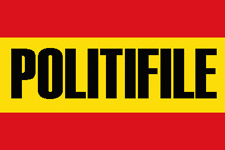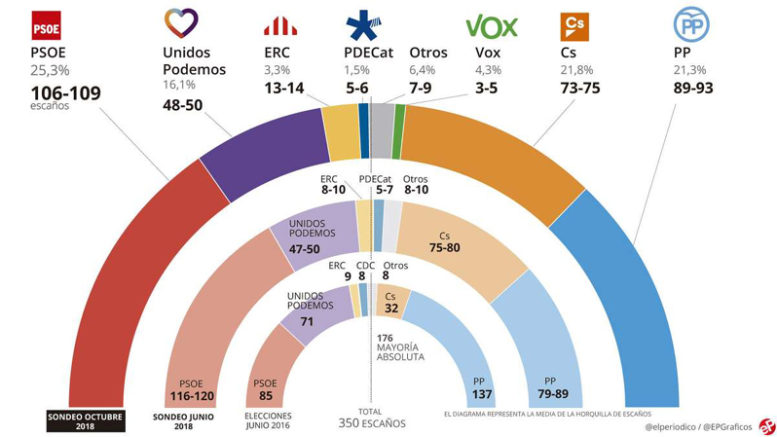Following the formal indictment of 22 Catalan independence leaders Friday on charges related to the northeast region’s October 2017 illegal independence referendum and intent to secede from Spain, Catalonia’s leading pro-independence parties have blamed the Socialist government of President Pedro Sánchez for not doing more to pressure prosecutors to withdraw the charges or seek lesser sentences for the defendants.
 In retaliation, both the Esquerra Republicana de Catalunya (ERC) and Partit Demòcrata Europeu Català (PDeCAT) have said they will not vote to approve the Sanchez admnistration’s 2019 budget.
In retaliation, both the Esquerra Republicana de Catalunya (ERC) and Partit Demòcrata Europeu Català (PDeCAT) have said they will not vote to approve the Sanchez admnistration’s 2019 budget.
Their refusal leaves the government short of a simple majority needed for budget approval and has generated apocalyptic headlines in the Spanish press after the leadership of the opposition conservative Partido Popular (PP) and centre-right Ciudadanos said the PSOE is now in an untenable position, governing in minority with just 84 deputies in Congress and no budget in sight for next year.
Since shortly after coming to power in June through a no-confidence vote against the PP government of Mariano Rajoy, Sánchez insisted that he intends to serve out the remaining two years of Rajoy’s term until 2020 and will not call early elections. Sánchez also said that none of the parties that joined together to oust Rajoy wanted early elections and it soon became clear that even while in a minority position the government could push through a number of progressive initiatives advanced by the PSOE and leftwing ally Podemos , increasing social spending while overturning unpopular legislation approved by the PP majority under Rajoy.
 Despite the post-indictment refusal of the ERC and PDeCat to support the 2019 budget, the Sánchez government has so far stuck to that story-line, noting that the Catalan pro-independence parties have nonetheless opted to remain in talks with the central government over budget outlays and legislative reforms and saying it may still be able to cobble together enough votes to get its budget passed.
Despite the post-indictment refusal of the ERC and PDeCat to support the 2019 budget, the Sánchez government has so far stuck to that story-line, noting that the Catalan pro-independence parties have nonetheless opted to remain in talks with the central government over budget outlays and legislative reforms and saying it may still be able to cobble together enough votes to get its budget passed.
Meanwhile, Economy and Business Minister, Nadia Calviño, acknowledged Monday that the Sánchez government has a “Plan B” in case of budget rejection, which is simply to roll over the 2018 budget that was designed by the Rajoy administration and stick to its legislative agenda as best it can, while serving out the rest of the current presidential term until 2020.
The Sánchez government’s logic for doing so may be reflected in the most recent voter preference surveys, which show that while the PSOE would gain substantially both in terms of vote share and congressional seats were elections to be held today, the combined number of seats allotted to the Socialists and ally Podemos would still fall short of securing a governing majority in Congress. The reason is a projected loss of seats by Podemos, many of whose supporters have been former PSOE voters now believed to have returned to the Socialist fold since Sánchez came to power.
Upcoming early elections next month in Andalucía may change that scenario, if the PSOE-A Socialist affiliate party in the southern region posts a strong showing and maintains majority control of the regional government.
With a general election victory in Andalucía key to formation of any government nationally, Sanchez and the PSOE could change their current long game strategy and opt for early elections next year. But, such a change seems likely only if the polls change dramatically in their favor or if an as-yet-unforeseen crisis of government forces the Socialists to change course in the coming months.
► Read More in Spanish at El País, Público and El Periódico …
► Read More in English at Bloomberg and The Financial Times …
► Click to read more news about Politics in Spain …
Check out more news from Spain about:
► Animal Welfare ► Corruption/Transparency ► Discrimination ► Education ► Children’s Rights ► Environment & Sustainability ► Fair Trade & Development Aid ► Healthcare ► Historical Memory ► Housing & Homelessness ► Human Rights ► Labour & Unemployment ► LGBT ► Peace & War ► Politics ► Poverty ► Refugees & Migration ► Technology & Social Enterprise ► Women’s Rights

